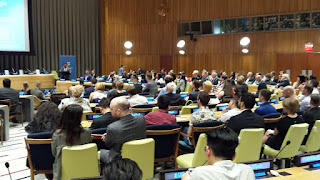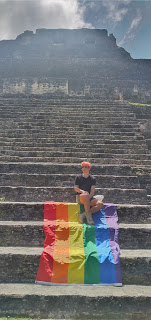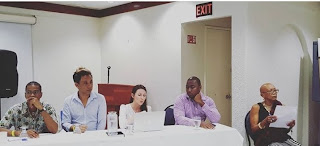Section 53 what it is and what it isnt
The current section 53 case seeks in its simplest terms to amend the law so that it does not apply to consenting adults. Its not about gay marriage. It not about targeting children. In fact, the case retains criminalization of sexual intercourse with minors. It also retains criminalization of having sex with animals. The following FAQ outlines in more detail the focus of the case. Believe it or not the requested amendment is about 4 words." with any person or" is the big offending language to the churches.
CALEB OROZCO & UNIBAM v ATTORNEY-GENERAL OF BELIZE
What is this lawsuit about?
This action is seeking a declaration from the Court that section 53 of the Belizean Criminal Code violates sections 3, 6 and 14 of the Belizean Constitution, and is therefore of no effect insofar as it applies to sexual intercourse between consenting adults.
Section 53 provides that:
“Every person who has carnal intercourse against the order of nature with any person or animal shall be liable to imprisonment for ten years.”
What does section 53 mean?
What a law means and what it does is not only what the statute says. In Belize, many of the details of the law are supplied by the ‘common law’, which really means patterns of decisions of judges over time.
At common law the unnatural offence has been interpreted as criminalizing anal sex. It does not matter whether the parties are both male or male and female, whether the parties involved are adults or minors, or whether the parties consent or not. In other words, this provision criminalizes all acts of anal sex between men and men, men and women and men and children, regardless of age and consent.
Why challenge section 53?
Although homosexuality is not technically illegal in Belize, here and in other jurisdictions where they exist the impact of laws like section 53 falls disproportionately on the lives of gay men. By criminalizing a sexual behaviour closely associated by the public with male homosexuality, it serves to tar all male-male sexuality as illicit. And it thereby legitimates discrimination and prejudice against people who are suspected of engaging in such behaviour. Such laws are often part of the reason why people feel justified in committing violence against gays, and lesbians as well.
This is the case even when such laws are not routinely enforced. They can still be used as threats by individual police officers, or as weapons to extort gay men. They are also one reason why gay people are afraid of cooperating or even seeking help from the police, especially when they are the victims of violence and extortion related to their sexual identity. Further, a political decision could revive the enforcement of the law at any moment. People’s freedom should not be dependent on political whim.
What is the actual objective of the case and what is it seeking redress for in the court?
The relief that is being sought is that the offence be ‘read down’ or amended, so that it will not apply to sexual intercourse between consenting adults in private.
This means that the action is not seeking the complete repeal of section 53. In its amended form, the provision will still criminalize sexual intercourse involving minor boys (who cannot legally give consent) as well as sexual intercourse between humans and animals. However, what will henceforth be outside of the law’s purview if the action is successful is private sexual activity between consenting adults – whatever their gender or sexual orientation.
Is this the best way to change the law? Shouldn’t reform be driven by public opinion?
Our independence constitution was specifically formulated to allow for this type of legal action. One of the primary aspects of the constitution is the separation of the Judiciary from the Parliament and the courts’ ability to overturn laws that are not consistent with the core principles of liberty and equality on which this country was founded. This is especially important when it comes to protecting citizens from abuse by the government and protecting minorities from discrimination by the majority. Belize has an established practice of such groups using the courts to get relief from unfair treatment. We are simply using the same democratic measures.
Like efforts to abolish slavery, it would also be possible to repeal section 53 by mobilizing public pressure or through a legislative campaign. But either would require much more money than the ‘judicial review’ which our Constitution deliberately set up to handle. Historically as well, it has proven difficult to legislate minority rights in many places that have not undergone violent civil conflicts. In the Caribbean, with our history of social stratification that lingers even after colonialism, activism by civil society is not an area in which we have much political experience. Governments and legislatures are very afraid to do what is right if that involves going against strongly held views. We have seen before how religious doctrines have stymied modernization and reforms even where governments recognise the need to dismantle discriminatory colonial laws, such as in the areas of divorce law and illegitimacy. Parliaments often operate with narrow and shifting majorities, and it has proven quite difficult in the Caribbean to develop a political culture that is not driven by base appeals to prejudice and emotion.
Why not exhaust all the options before taking this case to court?
Over the past few years, there have been many attempts and initiatives aimed at securing law reform. Since 2000 the Political Reform Commission Report recommended that protection against discrimination on the ground of sexual orientation be included in Belize’s constitution and that section 53 be repealed. In addition, the review process of the human rights records of UN Member States (referred to as the UPR) resulted in the government of Belize agreeing in 2009 to end discrimination against same-sex sexual activity between consenting adults and to review discriminatory legislation. However, despite these recommendations, the government has taken no further action, and these commitments remain on paper with no concrete force.
Thus, many options have been exhausted already, both internally and through international bodies. Given the lack of follow-up action, litigation is the only remaining avenue for ensuring that the government makes good on its promises.
Section 53 reflects Belizean values and morality about homosexuality, which are different from values in other countries.
Belize is a modernizing country that is part of the international community and the Latin American and Caribbean region. Belize’s local values have evolved with the transformation of the country from colonialism to independence. That evolution spans values that preserved systems of social inequality, slavery, racism and male domination to a post-independence vision of the fundamental humanity, equality and freedom of all persons. While the idea that certain kinds of private, consensual sexuality are immoral does have roots in Belize’s colonial past, a more contemporary, postcolonial vision of sexuality as a matter of self-determination is emerging in Belize. The Political Reform Commission has noted this, recommending the amendment of the Constitution to include protection from discrimination on the basis of sexual orientation, thereby reflecting changes in local values from 1944 when section 53 first appeared. For over five years Belize has had organisations fighting for equality and fair treatment for people regardless of sexual orientation. Belize is currently one of the few countries in Central and South America that punishes anal intercourse; in fact, many Latin American countries never had any such laws in the first place.
Homosexuality is a global phenomenon that occurs in the animal kingdom, spanning species, human cultures and political nations across the earth and over time. It has been observed, documented, written about and even celebrated from the earliest times. Like left-handedness or blue eyes, homosexuality is a naturally occurring variation among a minority of persons that does not threaten the survival of the species or society. Like other sexual practices, homosexuality has been subject to taboo in some religions, but it has also been associated with spiritual power in others. Even in Christianity, scholars like John Boswell note that a concern with male homosexuality in Church doctrine emerged only in the second half of the Christian era, and then as a ruse to persecute minorities. Other Biblical scholars point out that most of the scriptures commonly used as evidence that homosexual sex is forbidden exist alongside other rules regulating hygiene and behaviour, which are routinely ignored.
Belize is a State that separates religious rules from civil law. Unlike States like Afghanistan, Iran, Nigeria and Sudan where Islamic law governs, in Belize no one religion or faith determines what is or is not the law, especially in relation to matters such as diet, deportment and sexuality.
We already have a legal assessment and one national consultation, why do this case and disrupt our whole process?
This case does not seek to disrupt the existing process but rather to complement it. The legal assessment and national consultation relate specifically to laws impacting on the transmission of HIV. However, the challenge to section 53 by this action relates to more than considerations around HIV transmission. It is wider in that it argues that section 53 is unconstitutional because of it violates certain fundamental rights such as rights to human dignity, equality and privacy.
Moreover, the legal assessment and national consultation only recommended the repeal of section 53. If this action is successful, the court will order the government to amend the section to remove its unconstitutional aspects. In other words, this litigation can result in an enforceable outcome, whereas the national consultation only resulted in non-binding recommendations.
Changing the law will not change how people or the Church think about homosexuals.
Changing the law is not intended to change a person’s right to hold attitudes or opinions about homosexuality or other kinds of sexual and personal practices. In Belize, regardless of whether other individuals or faith-based institutions approve of one’s behaviour, this case is about protecting people’s right to have consensual sex in private.
Most importantly, even if homophobic attitudes remain, what this case will achieve if successful is the removal of a major legal barrier. This means that even if some people remain privately homophobic, they will be less able to act on those prejudices. Ultimately, the aim is to provide an environment where gays and lesbians can live peacefully and without discrimination, and the law is the first tool to secure such conditions.
If you do this case, does this mean that gay marriage is next?
This litigation is narrowly focused, and addresses only criminal proscriptions of certain sexual practices. Future advocates may or may not argue for same-sex marriage, but that is unconnected to section 53. If section 53 remains, this would not stop advocacy for same-sex marriage.
As an organization we support Caleb and UNIBAM in principle, but I’m not sure how we can help without over-extending ourselves.
Caleb and UNIBAM will certainly need all the support available, as there will unavoidably be opposition coming from certain sections of the community. However, support can take many forms. One of the most valuable ways to support this initiative would be by countering misinformation wherever it is disseminated, as well as by expressing your support publicly. Thus letters to the press, calls to talk shows and comments on blogs which express a favourable position on the litigation will boost public support and make the case for repeal stronger. Such support would be invaluable and costs nothing.
Do you have the support of the gay community about this move as it will bring more visibility to their lives?
The main participants in this case (UNIBAM, the lawyers and the funding agency) conducted a number of sessions with persons in the gay community in Belize City, Belmopan and San Pedro in order to provide information around the case and to deal with any questions or concerns. The intention is to have a number of similar sessions as the case progresses, so that the largest possible percentage of the gay community can be reached.
Thus far, those persons engaged have been generally favourable about the proposed litigation, but where concerns are raised these will be addressed with alacrity.
How will you deal with the fear mongering that will occur on the Talk shows with people thinking that this case will leave no protection for male children if they are sexually molested or exploited?
If successful, this case will not enable sexual predators to exploit minor boys with impunity, for it is not seeking the total repeal of section 53.
Instead, what this case is seeking is that section 53 be amended so that it does not criminalize sexual intercourse between consenting ADULTS in private. This means that section 53 will still be applicable to cases involving sex with minors, or cases involving sex without consent.
Are you hurting the country’s image if you take this case to court?
In 2006, the Yogyakarta Principles were drafted by a distinguished group of international human rights experts, outlining therein binding international legal standards relating to sexual orientation and gender identity. These principles clearly affirm that laws criminalizing homosexual acts violate the international right to equality and non-discrimination.
In keeping with these principles, many countries had already embarked on law reform to secure equality for lesbians and gays. In some, notably a number of European countries such as France, Belgium, Spain and the Netherlands, decriminalization of consensual same-sex acts between adults had begun as far back as the late eighteenth century. In others, such as most countries of both Western and Eastern Europe, as well as in other parts of the world such as China, Mongolia, Hong Kong, Fiji and parts of Latin America (Chile and Nicaragua), decriminalization of same-sex acts took place in the course of the last century. And in some countries, such as many in Latin America and East Asia, there had never been any legal prohibitions of sodomy in their laws in the first place.
Thus in a broad cross-section of countries in the world, from the Pacific to Latin America and from parts of Africa to Europe, and including the Bahamas here in the Commonwealth Caribbean, consensual same-sex activities between adults are not criminalized. As the Yogyakarta Principles acknowledge, all persons are born free and equal in dignity and rights. Sexual orientation is integral to every person’s dignity and humanity and must not be the basis for discrimination or abuse.
If Belize were to follow suit and amend section 53 accordingly, its image would not be damaged but rather its standing in the international community would be vastly improved. Decriminalizing same-sex activities between adults would be a reform in keeping with Belize’s own commitment to the United Nations Human Rights Commission given during the UPR process in 2006, as well as in keeping with modern understandings of international law. It would put Belize in line with the vast majority of countries in the world where such private, intimate aspects of a person’s life are not the subject of the law’s scrutiny, and where the law is not used to harass, demean or vilify others. Such a reform would enhance Belize’s standing internationally.



Comments
Post a Comment